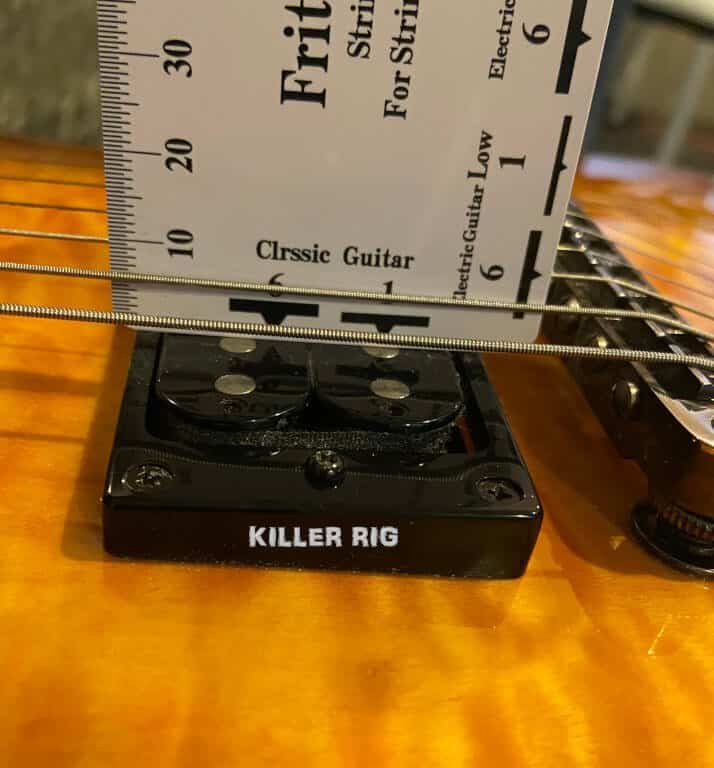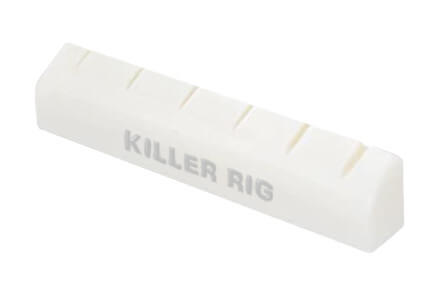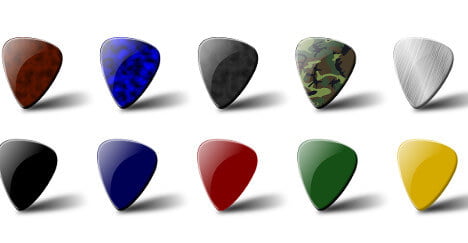Table of Contents
Electric guitar sustain is one of the more important aspects of the instrument. You want notes to ring out for as long as possible. This can be a challenge, especially if you are not sure what causes it or how to improve it.
Guitar sustain is the length of time that the strings on your instrument ring out. There are many factors that affect sustain.
The condition of the guitar and even the amplifier you are using plays a role. If you find that your notes don’t audibly resonate very long, then your guitar sustain is low.
In this Killer Rig article, we are going to look into guitar sustain, what it is and how you can get more of it!
What is Guitar Sustain?
Guitar sustain is the period of time a note or chord can be heard after it’s plucked or strummed. It’s also referred to as ringing out. It’s the measure of time that a guitar string will vibrate under the right conditions.
When we talk about increasing sustain on a guitar, we mean making the notes last longer. Increasing the time they make a sound before fading away.
There are two main reasons why you might want to increase the sustain on your guitar:
- To make your lead guitar solos more impactful.
- To make chords ring out for longer. So they sound fuller and more defined.
Increasing sustain can be useful if you play genres like metal or progressive rock. Long, sustained notes are often used to create an atmospheric soundscape.
Even if you don’t play metal, being able to make your chords ring out can give you a polished and professional edge. This makes performances that much better and more fun.
So how do you go about increasing sustain on your guitar? First, let’s take a look at some of the physics behind it.
The Physics of Guitar Sustain
To understand how to increase sustain, it helps to have a basic understanding of how it works in the first place.
When you pluck a string on your guitar, it vibrates and creates a sound wave. This sound wave is then captured by your guitar’s pickups and sent through your amplifier.
The longer the string vibrates, the more lengthy the sound wave will be. As a result, the note will sustain much longer. There are five main factors that affect how long a string will vibrate:
- The gauge of the strings. Heavier sets have more mass and therefore take longer to stop vibrating.
- The string length. The longer they are, the more they will vibrate and the greater they sustain.
- The tension of the strings. The more tension, the longer they take to stop vibrating.
- The condition of the electric guitar. Loose, worn, or improperly adjusted components will prevent the strings from vibrating.
- The mass and hardness of the wood that the guitar body is made from.
As you may have been able to tell, sustain is a product of rigidity. The more solid and rigid the guitar, the longer it will take the string to stop vibrating.
Thus, the more sustain you will end up with. This also means good quality parts are needed.
11 Ways To Improve Guitar Sustain
Now that we know how sustain works, let’s look at some practical ways to control it.
1. String Gauge
One of the easiest ways to increase sustain is by using heavy-gauge strings. Heavier strings will vibrate for a longer period than thinner ones. They also need more energy to set them in motion. This means they will vibrate with more amplitude or volume.
Of course, using heavy-gauge strings comes at a price. They are harder to bend, and if you use too heavy of a gauge, it can make your guitar sound muddy.
The best way to find the right string set for you is to experiment and see what sounds and feels great. A good place to start is with strings that are one or two gauges heavier than what you’re currently using.
Read our guitar string gauge guide here!
2. String Length
Longer strings will vibrate more, producing greater sustain. That’s why guitars with longer scale lengths usually ring out more.
Scale length is the distance between the nut and the bridge. Short-scale guitars around 20 to 22 inches will provide less sustain.
The difference between a 24 and 25.5-inch scale length isn’t enough to go sell all your guitars.
The length has to be at least 3 to 4 inches before you notice a large difference. But when choosing a guitar, make sure that it has a longer scale length if you need sustain.
3. Tension
The tension of the string also affects sustain. Strings under high tension will take longer to stop vibrating. They also need a harder pick attack to get them going. This will normally reward a player with more volume from the string as well.
If you play down-tuned guitars, you might experience less sustain. This is because tension is relieved when strings are tuned lower than standard.
If you need more sustain, you might want to consider a guitar tuning that adds tension to the strings.
4. Guitar Setup
A guitar that is not properly set up will never have good sustain. That’s because it might have strings that make contact with frets.
Or parts that are not properly aligned. There are many other issues that can prevent them from vibrating freely.
If you want your guitar to have good sustain, it’s essential that you set it up well. This means having the right tools and knowing how to use them. If you’re not comfortable doing a guitar setup yourself, take it to a qualified technician.
5. Pickups
The type of pickups you use can also affect sustain. Pickups with powerful magnets like Alnico V will pull on the strings more. This will cause them to stop vibrating sooner than a pickup with a weaker magnet.
You also have to be careful with the distance between your pickups and the strings. The closer the pickup is to the strings, the more the magnetic field will pull on them. This will cause notes to resonate less.
If you have high-output passive pickups, you may want to adjust this distance. A powerful magnet that is too close to the strings will rob you of guitar sustain.

6. Guitar Nut Material
The material your nut is made from will also affect the electric guitar’s sustain. A harder nut material like bone will help to transmit vibrations better.
Much better than a softer substance like plastic. This is because the hard guitar nut will allow the string to vibrate freely without dampening it as much.
This can lead to increased sustain and improved tone. So if you have a cheap plastic guitar nut, change it to Tusq or bone to get a good boost for very little money.
Read our article on guitar nut types here!

7. Guitar Body Material
The sustain obtained by a guitar is also due to the wood type the body is made from. A harder body wood like mahogany will transmit vibrations better.
A bit better than something softer like basswood, anyway. A softer body will absorb some of the energy of the vibrating string, causing notes to resonate less.
If you are shopping for a new guitar, this is an important consideration. Especially if you want notes to sustain as part of your technique. The right body wood will also be an important choice for the tone of your guitar, so choose wisely.
Want to learn more about guitar body tonewoods, click here!
8. Amplifier Settings
The settings you use on your guitar amplifier will also alter the sustain. If your gain setting is too low, you might not be getting the extra range possible.
Higher gain settings are known to extend your sustain. This is done by adding feedback and more harmonics. But if the setting is too low, you may not be getting these benefits.
A word of caution. Simply cranking the gain setting might also ruin the quality of your sound. The gain control is a powerful tool for tone shaping.
Too much can create a muddy or less clear tone in a hurry. So experimentation is needed to find the right settings.
You might also consider your EQ settings. More treble and midrange can also help. So if you have darker settings, brighten them up, and you are sure to get a bit more sustain.
Need guitar amp settings for metal? Click here!
9. Guitar Controls
If the volume is turned down too low, you might not be able to get enough output to sustain notes for long periods of time. It’s also a good idea to consider your guitar controls.
Your tone control settings can also play a role. A darker tone setting can shorten sustain, while a brighter one can lengthen it.
So if you want more control, experiment with different tone settings. At least until you find the right balance for your specific sound.
10. Pick Attack and Thickness

How hard do you strike the strings with a pick? A harder picking attack will cause the string to vibrate more. This can lead to more sustain.
So if you want more of it, simply use a harder picking attack. At least for the parts where you want the notes to ring out longer.
The thickness of your pick is also very important. A thinner pick will cause the string to vibrate less because it’s not very rigid. So try a few different pick thicknesses and see if it helps get more sustain.
Read our article on different pick types here!
11. Guitar Pedals
There are also guitar sustain pedals on the market that can help increase the amount of time a note will ring out.
These devices are placed on the floor and can be activated with your foot. They work by adding an extra boost of energy to the signal, which helps it vibrate for a longer period of time.
If you already use pedals, then you know how this works. Most players put them in the front of their signal chain and turn it on to get that added sustain.
I have used and recommend the Boss CS-3 Guitar Sustainer pedal. This is a great way to not only improve guitar sustain, but your sound at the same time.
A Compression pedal is also very handy when you need a boost. They not only help with note sustain, but the intensity of volume from each individual string.
This can be great when you need the sound to be as uniform as possible. Compressor pedals are used by some of the most experienced guitar players. This is because of their huge benefits.
Other Tips To Help With Sustain
There are many things that are also important to do regularly. Not only will they help with sustain from your electric guitar, but it’s performance as well.
- Clean your guitar. A dirty instrument will experience less resonance. This is because of the oils and build-up of gunk. Make sure to properly clean your guitar regularly.
- Change strings. Old guitar strings will not ring out the same as new ones. Make sure you are changing old strings when they are too worn out and lifeless.
- Replace Frets. Worn-out frets are absolutely terrible for good sustain. Make sure to have them changed when they are worn or damaged.
- Tighten loose screws. Occasionally it’s also a good idea to check the tightness of all screws on your guitar. If the neck bolts come loose, for example, sustain will suffer.
- Get a distortion pedal. If you have a clean amp and guitar with weaker pickups, then sustain will be hard to come by. A good distortion pedal can help and increase it quickly!
- Use a guitar sustainer. This is a device or pickup that has a built-in amplifier and is used to excite the strings. It will produce never-ending sustain and other neat sounds.
Conclusion
In conclusion, there are many ways to get more sustain from your electric guitar. Try out different techniques and see what works best for you. Also, be sure to keep your instrument clean and in good shape to ensure the best possible performance.
FAQs
Which guitar has the most sustain?
The Gibson Les Paul has been known for having lots of it. This is the guitar that many lead players rave about because of the sustain they provide. They are heavy, but they ring out!
Can a guitar have too much sustain?
No, a guitar will never have too much sustain. A guitar that has too much sustain can be controlled with proper muting techniques. This is easy to do for any skilled guitarist.
How do you keep an electric guitar from sustaining?
The first thing to try is lower gain and treble. If there is too much feedback, then you can also try rolling down the volume control on the guitar.

